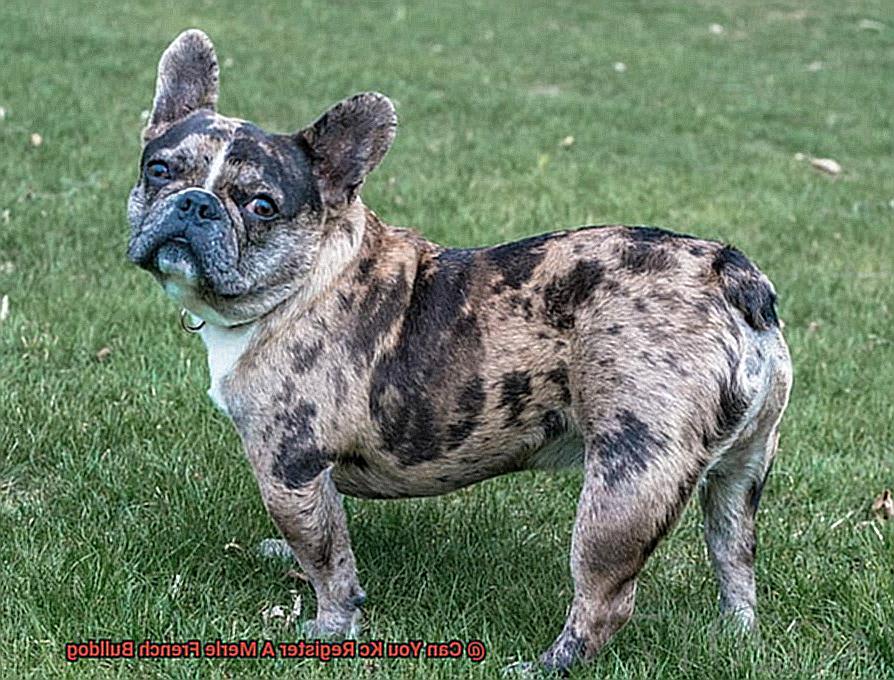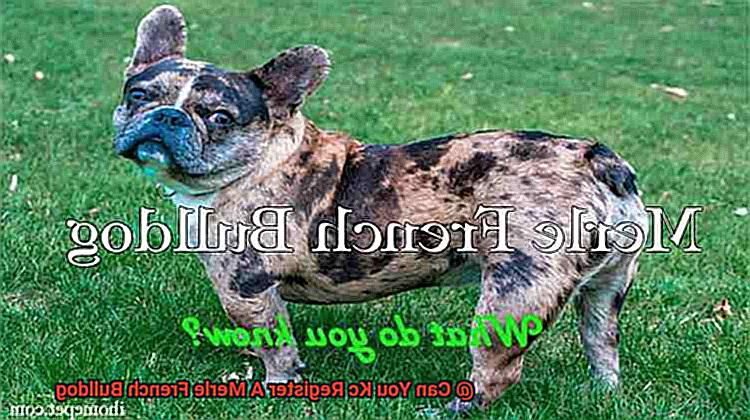Can You Kc Register A Merle French Bulldog?
Today, we’re diving into the fascinating world of merle French Bulldogs and tackling the burning question on everyone’s mind: Can you KC register a merle French Bulldog?
Now, if you’re not familiar with the term “KC,” don’t sweat it. We’re talking about the Kennel Club of the United Kingdom, a prestigious organization that takes care of registering and promoting purebred pooches. So, if you’ve got your heart set on a merle-coated Frenchie and you’re in Kansas City, Missouri, understanding how to get them registered is crucial.
In this blog post, we’ll break down the nitty-gritty steps involved in KC registering a merle French Bulldog. Plus, we’ll dish out some juicy details about what to consider and any potential hurdles you might face along the way. So, if you’ve been dreaming of adding an irresistible merle Frenchie to your fur family, keep reading to uncover all things registration in Kansas City.
Can You KC Register a Merle French Bulldog?
Contents
- 1 Can You KC Register a Merle French Bulldog?
- 2 What is a Merle Coat Pattern in French Bulldogs?
- 3 Why Does the KC Restrict the Registration of Merle French Bulldogs?
- 4 The Potential Health Risks Associated with Merle Coloration in French Bulldogs
- 5 Responsible Breeding Practices for Merle French Bulldogs
- 6 Guidelines for Showing and Participating in Events With Your Merle French Bulldog
- 7 How to Choose a Reputable Breeder When Acquiring a Merle French Bulldog
- 8 The Importance of Prioritizing Health and Well-Being Over Color Preferences
- 9 Understanding That KC Registration Does Not Diminish Your Love or Bond With Your Pet
- 10 Conclusion
Get ready to dive headfirst into the captivating realm of merle French Bulldogs as we tackle the burning question on every pup parent’s mind: Can you KC register a merle French Bulldog?
Now hold up if “KC” sounds like gibberish to you. We’re talking about none other than the Kennel Club of the United Kingdom – those folks who take care of registering and celebrating purebred pups. So if your heart is set on welcoming a mesmerizing merle-coated Frenchie into your life and you happen to be in Kansas City, Missouri – buckle up because understanding how registration works is key.
In this blog post, we’ll unravel the secrets behind KC registering a merle French Bulldog. Along the way, we’ll dish out some juicy details about what to consider and any potential hurdles you might encounter. So if you’ve been daydreaming about adding an irresistible merle Frenchie to your fur family, stick around as we uncover all things registration in Kansas City.
What is a Merle Coat Pattern in French Bulldogs?
French Bulldogs are known for their distinctive and adorable appearance, but one coat pattern that is often a topic of discussion is the Merle coat pattern. In this blog post, we will delve into the fascinating world of Merle coat patterns in French Bulldogs. We’ll explore what it is, why it’s not recognized by the Kennel Club (KC), potential health risks associated with it, and how to ensure the well-being of your Merle French Bulldog.
What is the Merle Coat Pattern?
The Merle coat pattern is a genetic trait that affects the color and pattern of a dog’s coat. It is caused by the Merle gene, which dilutes the base coat color and produces a mottled or marbled effect. French Bulldogs with the Merle coat pattern display patches of darker and lighter colors, creating a unique and eye-catching appearance.
Why Isn’t it Recognized by the KC?
The KC, as the official registry for purebred dogs in the UK, has set standards and guidelines for breeders and owners. The Merle coat pattern is considered a fault in French Bulldogs according to their breed standard. This means that Merle French Bulldogs cannot be registered with the KC.
Health Risks Associated with Merle Coloring:
Breeders and experts have observed that Merle French Bulldogs may be more prone to certain health issues. These can include eye abnormalities, hearing impairments, and other congenital defects. Therefore, responsible breeders prioritize the overall health and well-being of their dogs and avoid breeding Merle French Bulldogs.
Choosing a Reputable Breeder:
If you are considering getting a Merle French Bulldog, it’s crucial to do your research and find a reputable breeder who prioritizes health testing practices and produces genetically sound puppies. Responsible breeders will focus on breeding French Bulldogs without any potential health risks associated with the Merle coat pattern.
Caring for Your Merle French Bulldog:
While Merle French Bulldogs may not be eligible for KC registration, it doesn’t diminish their uniqueness and the love you have for your pet. Ensure their well-being by providing proper healthcare, including regular veterinary check-ups, and being aware of any potential health issues associated with the Merle gene.
Why Does the KC Restrict the Registration of Merle French Bulldogs?

The Kennel Club (KC) takes the health and welfare of dogs very seriously, which is why they have strict regulations when it comes to the registration of merle French Bulldogs. Let’s delve deeper into why the KC has imposed these restrictions.
- Increased Risk of Deafness: One of the main concerns with merle French Bulldogs is the higher risk of deafness. Studies have shown that dogs with the merle gene are more prone to developing hearing problems, including partial or complete deafness. This can greatly impact a dog’s quality of life and their ability to communicate and interact with their owners.
- Ocular Abnormalities: Another health issue associated with merle French Bulldogs is ocular abnormalities. Dogs with the merle gene may have a higher likelihood of developing eye conditions such as iris coloboma, abnormal pupil shape, and even blindness. These eye problems can cause discomfort and potentially impact a dog’s overall vision.
- Overall Breed Health: The KC’s restriction on registering merle French Bulldogs aims to minimize the breeding of dogs with these health issues and promote the overall well-being of the breed. By limiting the registration of merle French Bulldogs, the KC hopes to discourage breeders from prioritizing appearance over the health and welfare of the dogs they produce.
It is important to note that not all merle French Bulldogs will necessarily have these health problems, but the risk is higher compared to non-merle individuals. Responsible breeders understand and support this restriction as it helps maintain the integrity and health of the breed.
Despite the KC’s restrictions, there are still instances where merle French Bulldogs are registered with other kennel clubs or organizations that do not have the same stringent guidelines. However, it is crucial for potential owners to be aware of the potential health risks associated with merle French Bulldogs and to do thorough research before acquiring a dog of this coat color pattern from any source.
The Potential Health Risks Associated with Merle Coloration in French Bulldogs
Merle coloration in French Bulldogs has gained popularity due to its unique and captivating appearance. However, it is imperative for potential owners to understand the potential health risks associated with this coloration. In this blog post, we will explore these risks and why responsible breeding practices and awareness are crucial when considering a merle French Bulldog as your furry companion.
Hearing and Vision Problems:
- Merle coloration is caused by a genetic mutation, which can affect the development of the inner ear and optic nerves.
- Increased risk of hearing loss and vision impairment in merle French Bulldogs.
- Owners should be prepared for potential specialized care for dogs with these conditions.
Skin Problems:
- The gene responsible for merle coloration can impact the development and function of melanocytes, leading to skin allergies, irritations, and infections.
- Regular grooming and proper skincare are essential to mitigate these issues.
Genetic Disorders:
- Studies suggest a higher prevalence of certain genetic disorders in merle-colored French Bulldogs, including hip dysplasia, patellar luxation, and certain types of cancer.
- Further research is needed to fully understand the relationship between merle coloration and these health issues.
- Potential owners should consider these risks when deciding to acquire a merle French Bulldog.
Disqualification by Kennel Clubs:
- Merle coloration is considered a disqualifying fault by many kennel clubs, including the Kennel Club (KC) in the United Kingdom.
- Merle-colored French Bulldogs cannot be registered as purebred dogs or participate in conformation shows or breeding programs sanctioned by these kennel clubs.
- This disqualification aims to ensure the health and welfare of merle French Bulldogs.
Responsible Breeding Practices for Merle French Bulldogs
Merle French Bulldogs are undeniably eye-catching, with their marbled coats and unique patterns. However, responsible breeding practices are crucial to ensure the well-being of these beautiful dogs. In this blog post, we will delve into the importance of responsible breeding practices for Merle French Bulldogs and how they contribute to the preservation of the breed.
Understanding the Genetics:
The first step in responsible breeding is understanding the genetics behind the merle coat pattern. Merle is a dominant gene that, when two merle dogs are bred together, can result in serious health issues for puppies. Double merle or homozygous merle puppies have a higher risk of developing hearing and vision impairments, as well as other developmental abnormalities. To prevent this, responsible breeders should never intentionally breed two merle French Bulldogs together.
Selection of Breeding Pairs:
Responsible breeders prioritize the health and temperament of their breeding dogs, not just their coat pattern. When selecting breeding pairs, it is essential to choose mates that do not carry the merle gene. One parent should be a non-merle French Bulldog, while the other can be a merle or non-merle. This ensures that there is no risk of producing double merle puppies and reduces the chances of passing on genetic disorders.
Health Testing and Temperament:
Thorough health testing is crucial for responsible breeders. They should screen their dogs for common genetic conditions in the French Bulldog breed, such as hip dysplasia, patellar luxation, and eye disorders. Additionally, breeders should prioritize good temperament in their breeding dogs. Temperament testing can help identify any potential issues and ensure that the resulting puppies have stable and well-balanced temperaments.
Proper Care and Socialization:
Responsible breeders provide proper care and socialization for their puppies. This includes regular veterinary check-ups, appropriate vaccinations, and a nutritious diet. Puppies should also be exposed to various environments, sounds, and people to help them develop into confident and well-adjusted adults. Breeders should also educate new owners about the specific care needs of Merle French Bulldogs.
Guidelines for Showing and Participating in Events With Your Merle French Bulldog
So, you’ve got a beautiful Merle French Bulldog and you’re ready to show off their unique coat pattern in events. But before you hit the ring, it’s important to know the guidelines for showing and participating. In this guide, we’ll walk you through the key steps to ensure success while keeping your furry friend happy and healthy.
Research breed standards:
To start off on the right paw, familiarize yourself with the breed standards set by reputable organizations like the Kennel Club. These standards define the ideal characteristics and traits of Merle French Bulldogs. By understanding these guidelines, you can ensure your dog meets the criteria for participation and increase your chances of success.
Health checks and vaccinations:
Before strutting your stuff in events, make sure your pup is in great health. Regular vet check-ups are essential to catch any underlying health issues early on. Additionally, ensure your dog is up to date on vaccinations as many events require proof of vaccination for participation.
A well-trained and socialized dog is a confident and well-behaved one. Train your Merle French Bulldog in basic obedience commands like sit, stay, and heel. Socialize them by exposing them to various environments, people, and other animals. This will not only enhance their performance but also ensure their safety and ability to interact with others.
Grooming and presentation:
To shine in the ring, your Merle French Bulldog needs to look their best. Regular grooming is a must, including brushing their coat, trimming nails, cleaning ears, and maintaining dental hygiene. Pay special attention to the grooming needs of Merle French Bulldogs, as their coat patterns may require additional care. Practice proper handling techniques to showcase your dog’s structure and movement effectively.
Understand event rules and regulations:
Each event has its own set of rules and regulations. Familiarize yourself with these guidelines, including any specific requirements for Merle French Bulldogs. Some events may have restrictions or disqualifications based on coat patterns or health conditions associated with Merle French Bulldogs. By following these rules, you’ll ensure a smooth and successful participation experience.
Seek guidance from experienced handlers:
If you’re new to showing, don’t be afraid to ask for help. Experienced handlers or breeders can provide valuable insights and tips on training, presentation, and navigating the show ring. Building a network of fellow Merle French Bulldog enthusiasts can also provide support and resources for future events.
How to Choose a Reputable Breeder When Acquiring a Merle French Bulldog
Choosing a reputable breeder is a crucial step to ensure the health and well-being of your furry companion. In this blog post, we will guide you through the process of finding a reputable breeder who specializes in merle French Bulldogs. Let’s dive in.
In-person Visit
It is highly recommended to visit the breeder in person before making any decisions. This allows you to assess the breeding environment and how the dogs interact with the breeder. A reputable breeder will be transparent and welcoming, providing a clean and safe environment.

Health Testing

Reputable breeders prioritize the health of their dogs. They conduct health tests to ensure their breeding dogs are free from genetic diseases or conditions common in French Bulldogs. Ask for documentation of these tests to ensure the puppies are healthy.
Genetic Testing for Merle
Since merle is a color pattern that can carry certain health risks, choose a breeder who conducts genetic testing for merle-related issues. This ensures that the puppies are healthy and free from potential genetic problems associated with the merle gene.
Breeding Standards
A reputable breeder adheres to strict breeding standards set by kennel clubs or breed associations. They follow age restrictions for breeding dogs, limit the number of litters per year, and provide proper care and socialization for puppies.
References and Reviews
Reach out to previous buyers or individuals who have acquired a French Bulldog from the breeder. Ask about their experience, the health and temperament of their dog, and if they would recommend the breeder. Positive references and reviews are indicators of a reputable breeder.
The Importance of Prioritizing Health and Well-Being Over Color Preferences
When it comes to registering a merle French Bulldog with the Kennel Club (KC), it is essential to prioritize the health and well-being of the dog over color preferences. Merle coloring may be visually appealing, but it comes with potential health risks that should not be overlooked. This blog post will delve into the reasons why prioritizing health is crucial and why responsible breeders focus on overall well-being rather than specific coat colors.
Merle Coloring and Genetic Disorders:
- Merle coloring in French Bulldogs is not a natural occurrence; it is a dilution gene that can lead to various coat patterns.
- Breeding for color preferences can inadvertently perpetuate genetic disorders associated with merle coloring.
- One such disorder is Merle Ocular Dysgenesis (MOD), which affects eye development and can cause vision impairment or blindness.
- Merle French Bulldogs are more prone to eye conditions like cataracts and progressive retinal atrophy (PRA).
Increased Risk of Hearing Loss:
- Merle dogs have a higher likelihood of being born deaf or partially deaf due to congenital sensorineural deafness.
- Hearing loss can significantly impact a dog’s ability to communicate and interact with its environment.
Other Genetic Disorders:
- Prioritizing color preferences may increase the risk of other genetic disorders commonly found in French Bulldogs.
- Examples include brachycephalic respiratory syndrome (breathing difficulties due to flat faces), hip dysplasia, and various skin conditions.
Responsible Breeding Practices:
- Reputable breeders prioritize the health and well-being of their dogs above all else.
- They follow responsible breeding practices, including health testing, genetic screenings, and careful selection of breeding pairs.
- These breeders prioritize overall health and temperament rather than solely focusing on specific coat colors.
Seeking Guidance from Reputable Sources:
- Potential French Bulldog owners should do thorough research and seek guidance from reputable sources such as breed clubs or veterinary professionals.
- The KC has specific guidelines and rules regarding registration that should be followed to ensure the breed’s long-term health and well-being.
Understanding That KC Registration Does Not Diminish Your Love or Bond With Your Pet
When it comes to our pets, the love and bond we share with them transcend any external factors, such as KC registration. Whether your French Bulldog is KC registered or not, the connection you have with your furry friend is built on trust, companionship, and mutual affection. Here’s why KC registration should never diminish your love for your pet:
Registration does not reflect personality or behavior:
KC registration primarily serves as a way to maintain pedigree records of purebred dogs and ensure responsible breeding practices. It does not determine your pet’s personality or behavior traits. Your French Bulldog’s unique quirks, playful nature, and loving disposition are what truly make them special, not their registration status.
Quality of care is paramount:
Regardless of whether your French Bulldog is KC registered or not, what truly matters is the quality of care they receive. Regular veterinary check-ups, appropriate exercise and nutrition, socialization, and providing a safe and loving home environment are essential for the well-being of your pet. These factors contribute significantly to the strength of your bond with them.
Health and welfare come first:
Merle French Bulldogs have been a topic of controversy due to potential health issues associated with the merle gene. Responsible breeders prioritize the health and welfare of their dogs by conducting thorough health screenings for their breeding stock, regardless of coat color or pattern. By focusing on overall well-being rather than specific coat colors, these breeders ensure that you have a healthy and happy pet to love and enjoy.
Compatibility over registration status:
Responsible breeders place importance on finding suitable homes for their puppies based on compatibility rather than simply focusing on registration status. They consider factors such as lifestyle, living arrangements, and the ability to provide a loving and nurturing environment for the puppy. This ensures that you are matched with a pet that fits seamlessly into your life, regardless of their registration status.
Love knows no bounds:
The love and bond between you and your pet are not diminished by whether or not they are KC registered. It is the care, attention, and affection you provide that truly matter. Your pet does not love you any less because of their registration status. They cherish the time spent with you, the treats you give them, and the warmth of your lap, regardless of any official paperwork.
dD-H1D7NQFM” >
Conclusion
In conclusion, registering a merle French Bulldog with the Kennel Club (KC) is not possible. The KC strictly adheres to breed standards, and merle coloring is considered a disqualification for registration. This decision is made in the best interest of preserving the health and well-being of French Bulldogs.
Merle coloring in French Bulldogs is associated with a genetic mutation that can lead to various health issues, including hearing and vision problems. The KC prioritizes the welfare of dogs and aims to maintain the integrity of the breed by discouraging breeding practices that may compromise their health.
While some may argue that merle French Bulldogs are unique and visually striking, it’s important to remember that responsible breeding goes beyond aesthetics. Breeders should prioritize the overall health, temperament, and conformation of the dogs they produce.
If you’re considering getting a French Bulldog, it’s crucial to choose a reputable breeder who follows ethical breeding practices and prioritizes the well-being of their dogs. By doing so, you can ensure that your furry companion will be healthy, happy, and conform to breed standards.
In summary, while merle French Bulldogs may be visually appealing to some, they cannot be registered with the KC due to their association with potential health issues.




